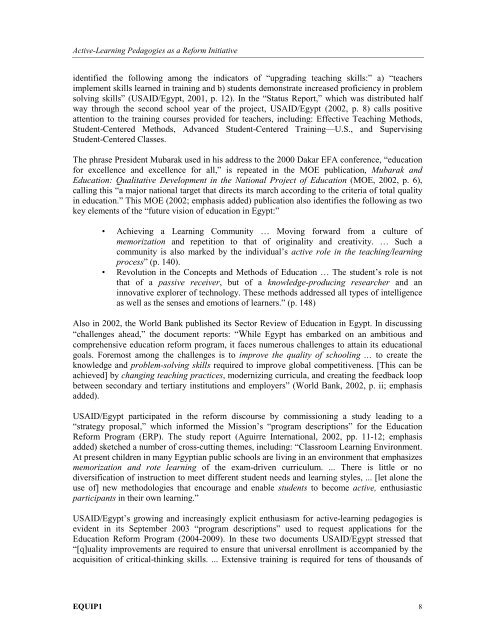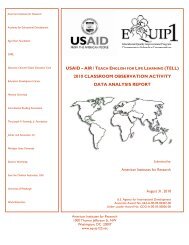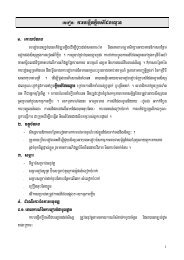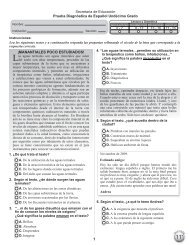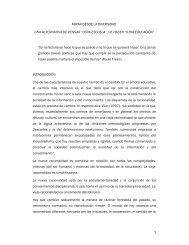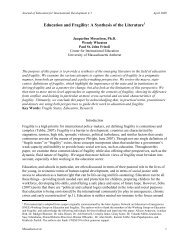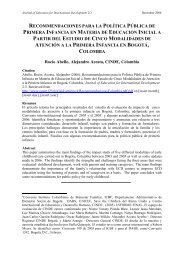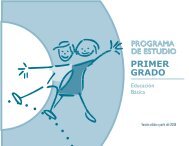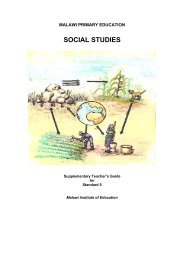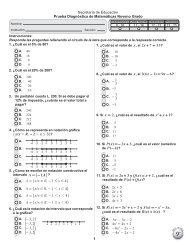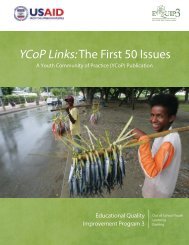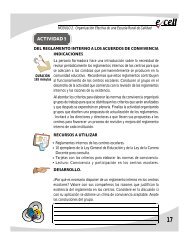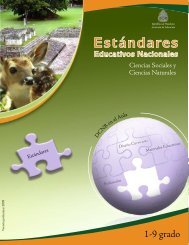Active-Learning Pedagogies as a Reform Initiative ... - EQUIP123.net
Active-Learning Pedagogies as a Reform Initiative ... - EQUIP123.net
Active-Learning Pedagogies as a Reform Initiative ... - EQUIP123.net
Create successful ePaper yourself
Turn your PDF publications into a flip-book with our unique Google optimized e-Paper software.
<strong>Active</strong>-<strong>Learning</strong> <strong>Pedagogies</strong> <strong>as</strong> a <strong>Reform</strong> <strong>Initiative</strong>identified the following among the indicators of “upgrading teaching skills:” a) “teachersimplement skills learned in training and b) students demonstrate incre<strong>as</strong>ed proficiency in problemsolving skills” (USAID/Egypt, 2001, p. 12). In the “Status Report,” which w<strong>as</strong> distributed halfway through the second school year of the project, USAID/Egypt (2002, p. 8) calls positiveattention to the training courses provided for teachers, including: Effective Teaching Methods,Student-Centered Methods, Advanced Student-Centered Training—U.S., and SupervisingStudent-Centered Cl<strong>as</strong>ses.The phr<strong>as</strong>e President Mubarak used in his address to the 2000 Dakar EFA conference, “educationfor excellence and excellence for all,” is repeated in the MOE publication, Mubarak andEducation: Qualitative Development in the National Project of Education (MOE, 2002, p. 6),calling this “a major national target that directs its march according to the criteria of total qualityin education.” This MOE (2002; emph<strong>as</strong>is added) publication also identifies the following <strong>as</strong> twokey elements of the “future vision of education in Egypt:”• Achieving a <strong>Learning</strong> Community … Moving forward from a culture ofmemorization and repetition to that of originality and creativity. … Such acommunity is also marked by the individual’s active role in the teaching/learningprocess” (p. 140).• Revolution in the Concepts and Methods of Education … The student’s role is notthat of a p<strong>as</strong>sive receiver, but of a knowledge-producing researcher and aninnovative explorer of technology. These methods addressed all types of intelligence<strong>as</strong> well <strong>as</strong> the senses and emotions of learners.” (p. 148)Also in 2002, the World Bank published its Sector Review of Education in Egypt. In discussing“challenges ahead,” the document reports: “ hile Egypt h<strong>as</strong> embarked on an ambitious andcomprehensive education reform program, it faces numerous challenges to attain its educationalgoals. Foremost among the challenges is to improve the quality of schooling … to create theknowledge and problem-solving skills required to improve global competitiveness. [This can beachieved] by changing teaching practices, modernizing curricula, and creating the feedback loopbetween secondary and tertiary institutions and employers” (World Bank, 2002, p. ii; emph<strong>as</strong>isadded).USAID/Egypt participated in the reform discourse by commissioning a study leading to a“strategy proposal,” which informed the Mission’s “program descriptions” for the Education<strong>Reform</strong> Program (ERP). The study report (Aguirre International, 2002, pp. 11-12; emph<strong>as</strong>isadded) sketched a number of cross-cutting themes, including: “Cl<strong>as</strong>sroom <strong>Learning</strong> Environment.At present children in many Egyptian public schools are living in an environment that emph<strong>as</strong>izesmemorization and rote learning of the exam-driven curriculum. ... There is little or nodiversification of instruction to meet different student needs and learning styles, ... [let alone theuse of] new methodologies that encourage and enable students to become active, enthusi<strong>as</strong>ticparticipants in their own learning.”USAID/Egypt’s growing and incre<strong>as</strong>ingly explicit enthusi<strong>as</strong>m for active-learning pedagogies isevident in its September 2003 “program descriptions” used to request applications for theEducation <strong>Reform</strong> Program (2004-2009). In these two documents USAID/Egypt stressed that“[q]uality improvements are required to ensure that universal enrollment is accompanied by theacquisition of critical-thinking skills. ... Extensive training is required for tens of thousands ofEQUIP1 8


